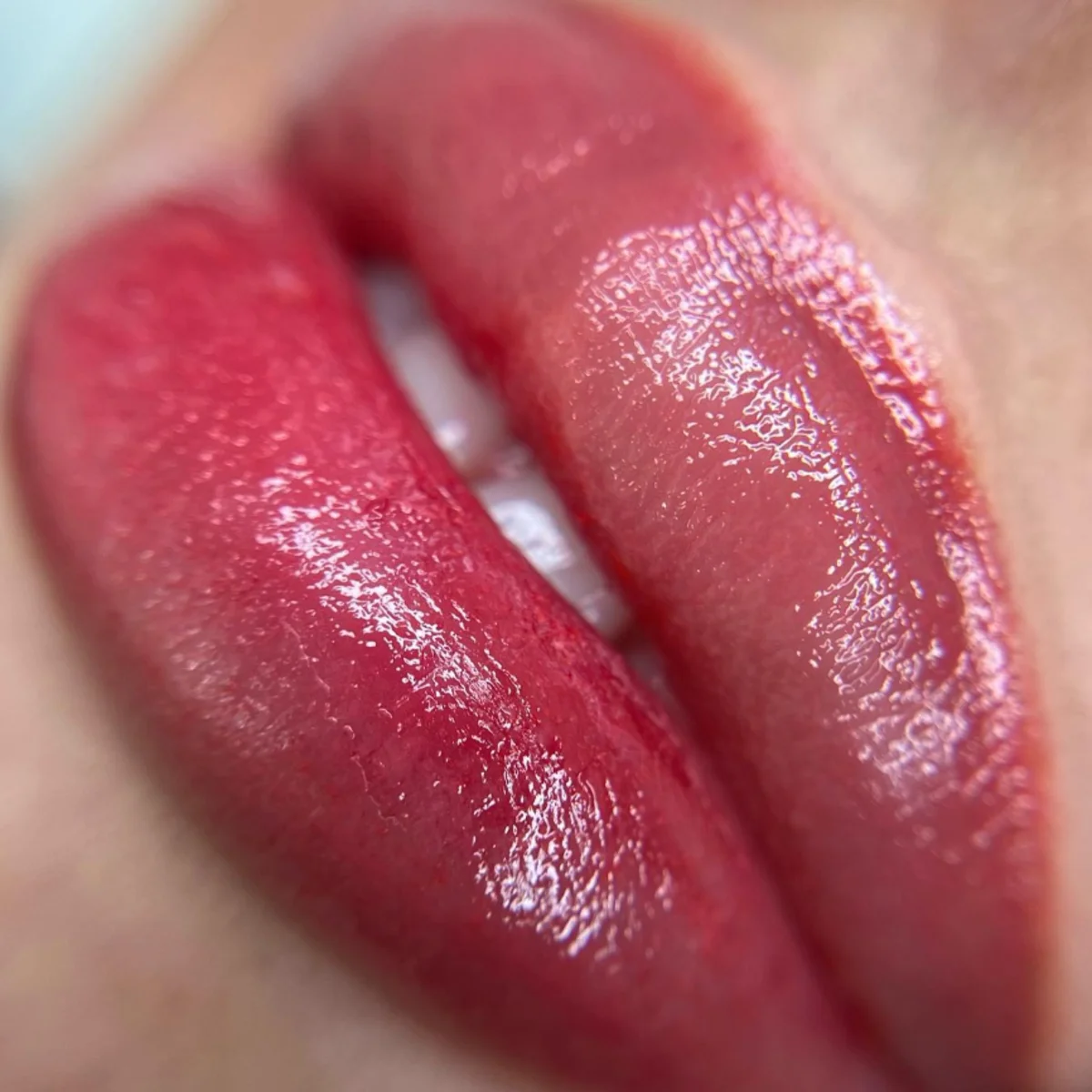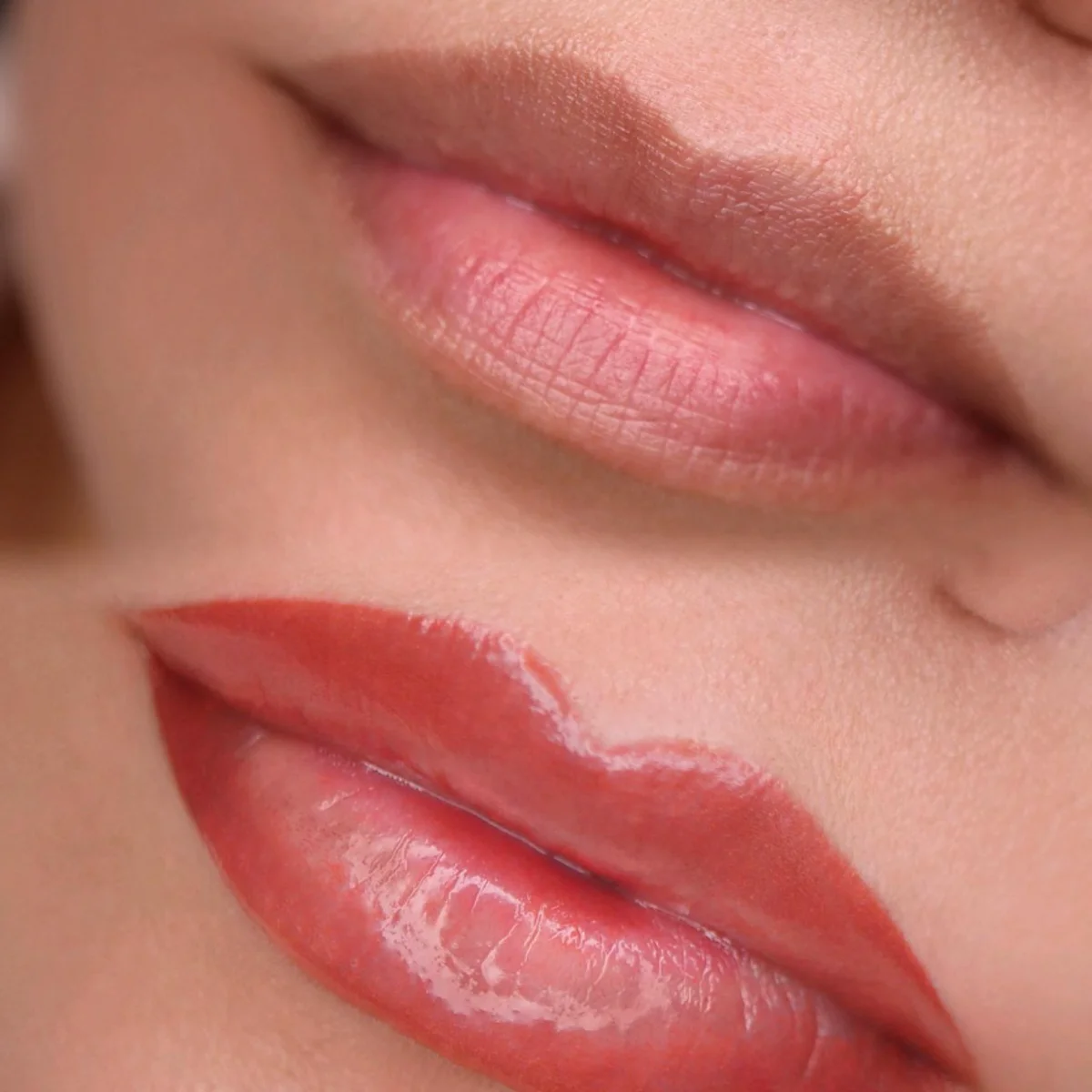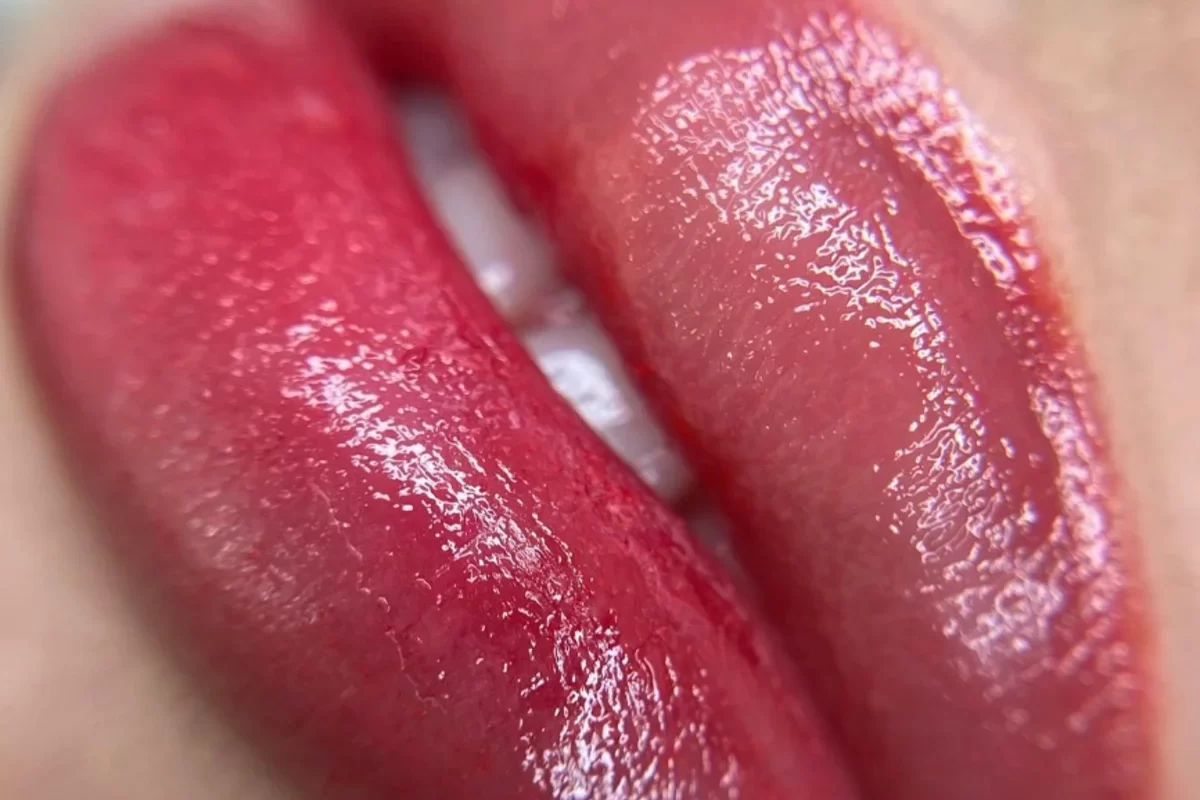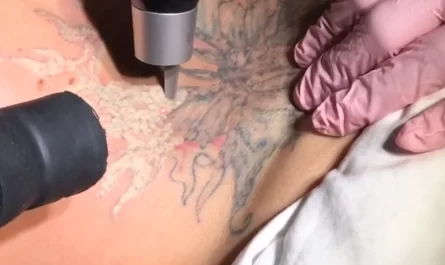Lip tattoos, also known as lip blushing or lip tinting, are a semi-permanent cosmetic procedure that enhances the colour and shape of the lips by depositing colour ink into them and along the lip line.

What is a lip tattoo?
Lip blushing is a semi-permanent cosmetic technique that enhances the lips by adding a subtle hint of natural colour. Unlike bold lipstick, the colour is sheerer and less intense. Lip blushing covers the entire surface area of the lips instead of just outlining them like a lip liner.
Benefits
- Achieve a natural yet defined look for your lips.
- Maintain a polished appearance at all times with the convenience of waking up with makeup.
- This product is waterproof and sweatproof, which can benefit those with active lifestyles or oily skin that may cause makeup to smudge and wear off quickly.
- Convenience aids in enhancing everyday life and conserving time.
- This product simplifies makeup application for those with vision impairment or unsteady hands.
- For individuals with allergies to cosmetics, this may be a viable option.
- This product helps to even out lip discolouration caused by various factors such as vitiligo, cancer treatments, illness, injury, or natural causes.
- Enhance thin or asymmetrical lips with fullness and symmetry.
Risks of getting a lip tattoo
Tattoos are popular but come with risks and side effects to be aware of. Common issues include discomfort, bleeding, swelling, and dry skin during and after the procedure. Allergic reactions, infection, scarring, colour shifting, and skin pigmentation changes are also possible outcomes. To reduce these risks, select a skilled tattoo artist, ensure you are a suitable candidate, and follow proper aftercare instructions.
Who should not get lip tattoos?
- Individuals who are younger than 18 years old.
- Pregnant or nursing
- Individuals requiring insulin injections due to diabetes (doctor’s approval necessary)
- A doctor’s clearance is required for individuals with an autoimmune disease.
- On blood thinners
- Have epilepsy
- Infections can occur either locally in a specific area or throughout the body.
- Have major heart problems
- Had an organ transplant
- Individuals with skin conditions such as eczema, psoriasis, rashes, sunburn, acne, etc., should avoid procedures in those affected areas.
- Individuals prone to keloid scars or hypertrophic scarring may experience increased skin tissue growth during healing.
- Consult with your doctor before undergoing chemotherapy or radiation.
- Individuals with sensitivities to dyes, pigments, or local anesthetics may undergo patch testing for identification.
Preparing for a lip tattoo appointment
Prepping your canvas is crucial for creating a quality piece of art.
- To prevent outbreaks, individuals prone to cold sores must take oral antiviral medication two days before and three days after treatment.
- If you have a specific colour in mind, bringing a few reference photos or examples of your desired lipstick shade to your appointment is helpful.
- Staying hydrated by drinking plenty of water and keeping your lips moisturized starting one week before is recommended.
- Prepare your lips for your appointment by exfoliating them at home with a homemade coconut oil and sugar scrub. Use a lip conditioner or balm daily before your appointment to keep your lips in good condition.
- It is recommended to avoid consuming alcohol, caffeine, or blood thinners (such as Aspirin, Ibuprofen, fish oil, niacin, and vitamin E) for 48 hours before your procedure to minimize excess bleeding, which can impact colour retention.
- It is recommended to avoid sun and tanning bed exposure for 30 days before and after your procedure to prevent the tattoo pigment from being removed as your skin exfoliates from a sunburn.
- It is advisable to schedule any vacations at least 14 days after the procedure.
- It is recommended to schedule cosmetic procedures like lip fillers at least four weeks before getting a lip tattoo.
Lip blush tattoo procedure
Before the procedure, your artist will consult with you to assess your suitability, which may involve filling out a health questionnaire and giving informed consent. They should also give you time to ask any questions you may have.
Your artist will first outline the shape of your ‘new’ lips for you to approve. A topical numbing cream will be applied for 15-20 minutes before the cosmetic tattooing. You may experience mild pain and some bleeding during the process. The entire procedure typically takes 2-4 hours to complete.
The pigment in the lip blushing procedure will initially appear intense and vibrant but will gradually soften and lighten as it heals. It is expected to experience a 30-50% colour loss between the initial and touchup appointments, as lip blushing typically involves a two-part process.
Aftercare following a permanent makeup lip procedure
After getting a tattoo, following the aftercare instructions provided by your tattoo artist, which may include keeping the tattoo clean and protected for proper healing, is essential. During the healing process, your skin will experience changes such as dryness, itching, scabbing, and flaking. It is crucial to avoid picking, scratching, pulling, or trying to expedite the healing process prematurely to minimize complications and achieve the best outcome.
During the healing process, avoiding acidic, spicy, and citrus foods and excessive sun exposure, swimming, and perspiration is crucial. Refrain from using skin care products and makeup and exfoliating the area to prevent pigment and healing disruption. Use cold compresses to reduce swelling and discomfort, and apply the healing balm provided to moisturize and repair the skin. Healing time can vary but typically lasts two weeks for the superficial layers and 4-6 weeks for the deeper layers of the skin. Scabbing usually occurs for 5-7 days within the first two weeks.
When sun exposure, using an SPF chapstick for long-term care of your permanent cosmetics is essential. Sun exposure can cause fading or alter the pigments. If you plan a chemical peel, laser treatment, plastic surgery, or MRI scan, inform your technician about your lip tattoo.

For whom is lip tattooing appropriate?
Micropigmentation offers a long-term solution for individuals seeking to enhance their appearance and self-confidence while minimizing the time, inconvenience, and cost associated with makeup application.
Are lip tattoos painful?
Cosmetic tattoo artists usually use numbing products on your lips before and during the procedure for comfort. You can take Acetaminophen (Tylenol) before the appointment, but avoid NSAID drugs like Aspirin, Ibuprofen, etc., as they increase bleeding time. Pain sensitivity may be higher during your menstrual cycle. Factors like sleep, stress, and caffeine can also affect pain sensitivity.
How much for a lip blush tattoo?
The cost of lip tattooing can vary depending on shop location, technique, and artist experience. In general, permanent makeup lip tattoo ink can range from $400 to $ 800.
How long does a lip blush tattoo last?
Permanent makeup cosmetic tattoos will fade over time, requiring a touchup every 2-5 years. Fading depends on pigment colour, sun exposure, skin type, general health, and aftercare. Smokers or those with iron deficiency anemia may experience faster fading. Results will vary for each client.
Do lip tattoos work well on darker skin tones?
Individuals with darker-toned lips may consider cosmetic treatment as a way to lighten or even out lip colour. However, those with a Fitzpatrick scale of 5 or 6 may have a higher risk of permanent complications, such as colour shifting, hyperpigmentation, or skin hypopigmentation. It is recommended that a permanent makeup artist be selected who is skilled and experienced in working with dark-skinned clients.
Do lip tattoos have value?
It can be said that investing in a reputable tattoo shop and artist who delivers natural and beautiful results can save time, offer convenience, and boost confidence.


